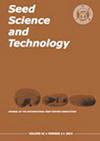Seed dormancy and germination ecology of several clover species
IF 3
4区 农林科学
Q2 AGRONOMY
引用次数: 0
Abstract
This research was carried out to evaluate the effect of (1) different methods of breaking seed dormancy (physical and chemical scarification, high temperature, hot water and after-ripening), and (2) environmental factors (temperature, salinity and water stress) on seed germination of Trifolium angustifolium , T. arvense , T. fragiferum , T. fucatum , T. repens , T. subterraneum and Trifolium sp. All experiments were conducted in the Seed Research Laboratory of Gorgan University of Agricultural Sciences and Natural Resources, Iran, in 2021. All the examined clover species were dormant after harvest, with little germination. Mechanical scarification with sandpaper or sulphuric acid resulted in more than 88 and 52% germination, respectively. Seeds were able to germinate between 5 and 35°C, but the highest germination (≥ 98% on average) occurred at 20°C. Fluctuating temperature regimes were more efficient in improving the germination than constant temperatures. Seeds of clover species, in addition to having a hard seed coat, have a non-deep physiological dormancy. Fresh seeds showed a high sensitivity to water stress compared with after-ripened seeds. However, relative resistance to salinity stress was observed. The results obtained in this research can be used to develop effective sowing strategies and support the successful establishment of these clover species.几种三叶草种子休眠与萌发生态学研究
本文研究了(1)打破种子休眠的不同方法(物理和化学切割、高温、热水和催熟)和(2)环境因子(温度、盐度和水分胁迫)对三叶草(Trifolium angustifolium, T. arvense, T. fragiferum, T. fucatum, T. repens, T. repens)种子萌发的影响。所有实验均于2021年在伊朗戈尔根农业科学与自然资源大学种子研究实验室进行。所有被检查的三叶草品种在收获后都处于休眠状态,很少发芽。用砂纸或硫酸进行机械划伤的结果分别是88%和52%。分别发芽。种子在5 ~ 35℃之间能够发芽,但最高的发芽率为5 ~ 35℃。98年,percnt;(平均)发生在摄氏20度。波动温度比恒定温度更能有效地提高种子的萌发率。三叶草的种子除了有坚硬的种皮外,还有一个不深的生理休眠。鲜种子对水分胁迫的敏感性高于熟后种子。然而,观察到其对盐胁迫的相对抗性。本研究结果可用于制定有效的播种策略,并为三叶草品种的成功建立提供支持。
本文章由计算机程序翻译,如有差异,请以英文原文为准。
求助全文
约1分钟内获得全文
求助全文
来源期刊

Seed Science and Technology
农林科学-农艺学
CiteScore
3.00
自引率
28.60%
发文量
36
审稿时长
>36 weeks
期刊介绍:
Seed Science and Technology (SST) is an international journal featuring original papers and articles on seed quality and physiology related to seed production, harvest, processing, sampling, storage, genetic conservation, habitat regeneration, distribution and testing. A journal that meets the needs of researchers, advisers and all those involved in the improvement and technical control of seed quality. Published every April, August and December.
 求助内容:
求助内容: 应助结果提醒方式:
应助结果提醒方式:


